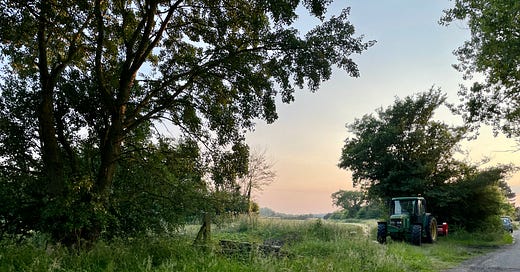Five o’clock on a warm July morning and I’m awake with the sparrows: one new brood from the nest under the cracked clay pantile, two this year from my swift box. At sun-up they sit on my gutters and chitter, parents, youngsters and juveniles. In summer I sleep with the old iron casement open and they wake me. But on a morning like this one, with a long day’s work ahead of me, waking early creates a little free time I wouldn’t otherwise have. Honestly, I can’t say that I mind.
Here in Suffolk we had five or so days of hot weather a couple of weeks ago, perfectly timed for haymaking. Since then it’s either been drizzly, grey, or downright wet. But now I can see sun edging my bedroom curtains and more than that, I can tell by the voices of the sparrows that the weather is dry.
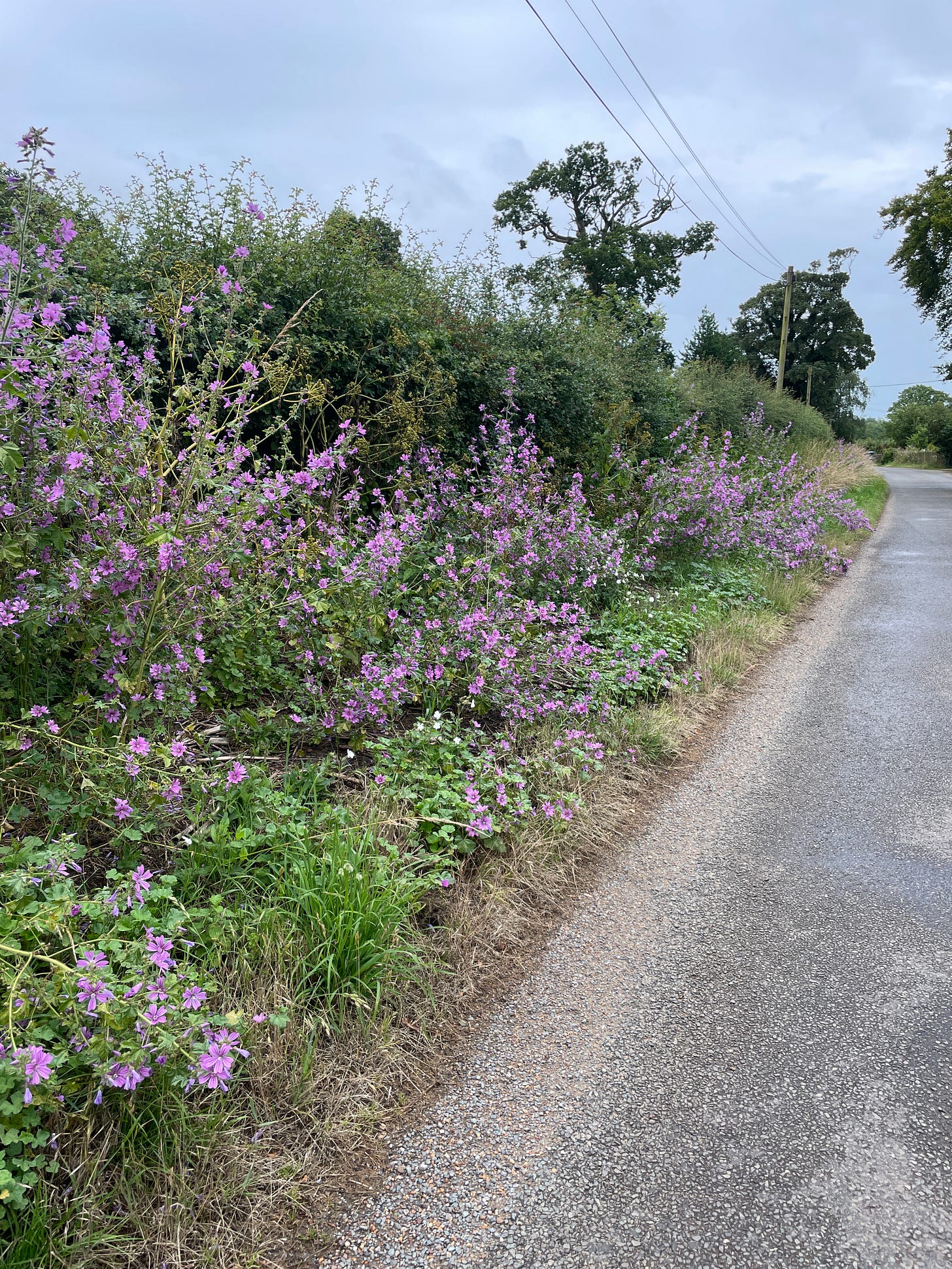
An early breakfast then I’m out on the rattly old Duchess to make the most of it before work claims me, her tyres hissing over the damper parts of the lanes. Everywhere, wildflowers embroider the road margins: tall stands of mallow, white campion, ox-eyes, yellow ragwort and hogweed, nettles in their diffident flower, bedstraw and dark hedge woundwort. But wind and rain have battered the unripe barley closest to the village and much of it has ‘lodged’. This can prove a problem at harvest time, potentially reducing the yield, and modern crops have shorter stems than those that were grown a century ago, to try and lessen the impact. Swallows scud over both lodged and unlodged areas, scooping up craneflies and other insects that rise from the humid thatch.

I take a lane that leads me past the coloured cows and calves and over our little river, young rabbits flashing their white tails and vanishing into the hedges as I pass. The Duchess bangs over old road repairs and new potholes, a winter’s worth of storms plaguing the bike springs – and the base of my spine. This is an old landscape, the narrow lane once a track that led from farm to farm without greater ambition, and it winds around the corners of small fields long swallowed into larger ones, or loops around marshy areas that have been drained for the last two hundred years. Not far out of the village it passes between a lovely old L-shaped farmhouse with small, mullioned windows and what was once its black-timbered threshing barn, now a family home; and then on, on, to the next set of labourers’ cottages, the next age-old cluster of farmhouse, stables and outbuildings.
A hen kestrel sits on an overhead cable, pivoting her tail against the breeze and watching for small mammals among the tangled field margins, principally voles; she can see the urine that marks their habitual trails, which shows up in the ultraviolet spectrum. As I approach she drops from the wire and angles unhurriedly away, and as she does so, from an oak a pair of wood pigeons launches out in a clatter of wings.
Wheat on the left now, stiff and bluish compared to barley but beginning to bleach to yellow downwards from the ripening ears. It needs some decent sunshine to really bring it on, and I hope we get it – if not for mine, for the farmers’ sakes. The mayweed is out now, great mounds of it, dotted with poppies here and there, and agrimony, and stray mallow. From somewhere high above drifts the keening of swifts.
A cluster of cottages and a red postbox where I change down a gear as the road begins to climb to what we in Suffolk call a hill, but anywhere else would attract little remark. There’s a smallholding here with duck eggs for sale and a whiteboard tied to the gate on which a joke is always written, updated weekly. Today it reads, in shaky capitals, ‘A FRIEND TOLD ME HE COULDN’T AFFORD HIS WATER BILL. I SENT HIM A GET WELL CARD’.
On I go, slowing a little up the hill, getting a little bit of a sweat on and picking gnats from my eyelashes and teeth. In another old farmyard the cargo bed from a lorry rusts gently beside an old brick barn, and a pair of magpies stalk the weedy concrete. Then come a couple of mid-century houses with lovely views out across the fields; laundry flaps on the line and a duvet cover is airing from an open window. In a tidy vegetable bed, under netting, rows of chard are fast approaching rhubarb size.
From the high ground it’s a long downhill race almost all the way back to the village and I freewheel the best bits, shirt flapping, grinning like an eight-year-old, bell dinging faintly as I rattle over ruts. It comes to me as I let myself back into the cottage that there’s another benefit of getting out early: in forty or so minutes’ cycling I haven’t passed a single car.
Apart from the gentlest of showers, soon over, the day continues fine – yet I spend most of it on Zoom calls, scrambling to hit writing deadlines and looking numbly at spreadsheets. I’m working hard at the moment, a little over capacity, if I’m honest. I’m supposed to be a nature writer, yet days can pass without me getting outside at all.
But that evening as I’m finding something to eat I hear a bell toll timorously from the church tower in the village, and then comes a tumble of them, bolder and bolder, falling over one another to spread out across the evening fields. It’s bell-ringing practice, and the sound draws me out of the cottage just as it would once have summoned the faithful to church.
It’s out into the woods and darkening lanes for me though, a soft and clear summer evening too rare, this year, to miss. A song thrush is calling from a thicket and rooks are massing in the copses, ready to join together and roost. Swifts climb thermals over the warm fields; it won’t be not long now until they leave us, the first of our summer visitors to depart.
I feel as though I’ve spent all year, since January, waiting for something I can call summer – but the world hasn’t been waiting, it’s just been getting on as best it can. If I hadn’t been woken by sparrows or summoned by bells I would have missed today entirely; and now, I see at last, the year is turning, summer weather or no. What a waste it would be to spend any more of it waiting for anything. Listen: time passes, say the church bells. For we are golden in the mercy of time’s means.
News
As most of you will know by now, I’m developing a nature journalling app called Encounter, designed to help connect people to their nearby wild and inspire them to care for nature. As well as being a journal, it’ll deliver seasonal info from me that will let users know what they can look out for, all through the year.
Our first funding round – to raise the money to build the launch version – had a goal of £50k, and we are almost there now. We need one more person to invest £5k and then we’ll have hit our target and can go ahead. Could it be you? Please drop me a line if so, and I’ll send out further information about the business. We are so close!
On Friday a new episode of Matthew Bannister’s Folk On Foot podcast came out, in which the extraordinary experimental musician Laura Cannell and I go for a walk in Suffolk and talk about all sorts of things, and she improvises with nightingales. Nightingales! It’s on all the usual podcast platforms, or you can listen to it here.
It was my turn for the Nature Notebook in The Times yesterday, and I wrote about a farm not far from me where they’ve been feeding and looking after turtle doves and have seen numbers increase from two in 2016 to 18 this year. Given that the breeding population of this pretty, purring little dove has fallen by 99% since the 1960s, and is now estimated at just a couple of thousand, 18 is a not insignificant number.
Turtle doves are very photogenic and charismatic, but there are thousands of other species in trouble at the moment, many of which live in or visit ordinary gardens like yours. Do you know who your non-human neighbours are, and how they’re doing? Watching the turtle doves on my friend’s lawn was a reminder of the tangible good that even one person, or one family, can do, just by noticing who they share space with, and finding out how they can help.
Speaking of making a difference, I’d like to briefly toot my own trumpet, if you’ll allow. In 2021 I noticed a couple of stands of Himalayan balsam growing near me, both in ditches that drain into our local river. This invasive annual poses a threat to the health of waterways; a non-native, not enough other species here eat it in order to keep it under control, so it forms vast thickets which choke out other bankside wildflowers which are important for biodiversity. Having done that it then dies back in autumn, leaving the soil exposed and vulnerable to river erosion. Whole stretches of bank can be washed away in winter, including vital water vole habitat.
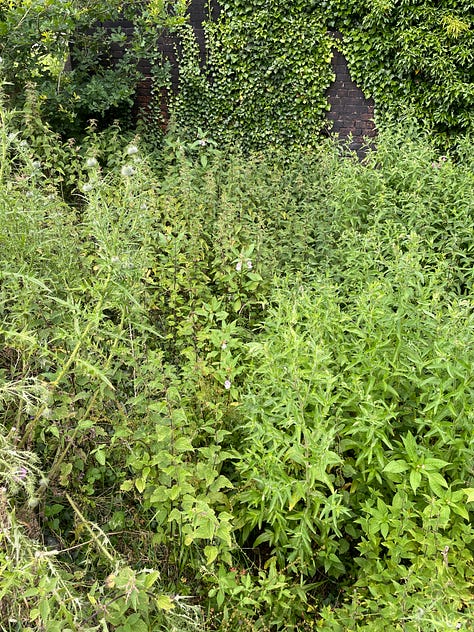
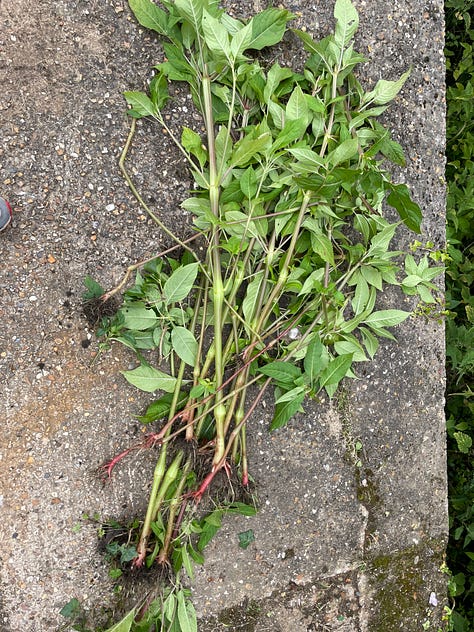
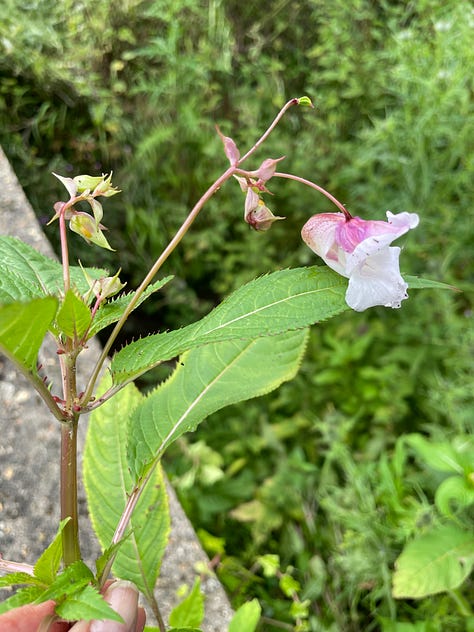
Each July and August since then I’ve been visiting both patches of balsam on my regular perambulations and either removing the flowers before they set seed or pulling up the plants (they are shallow-rooted). Happily its seeds don’t persist for long in the soil, and as of last week the larger patch now consists of fewer than a dozen plants, easily dealt with, and the smaller one has entirely vanished. Next year there could well be none at all, and if so, I may have prevented its spread into this part of our river.
I mention this as a reminder that things getting worse is far from inevitable, and it is always, always worth doing what you can to help.
I’ve reviewed a couple of books for the Guardian recently, one of which is here. The other was of Evie Wyld’s fourth novel, The Echoes. It’s due to be published on August 1.
She is an utterly astonishing writer. There’s a controlled darkness to her books that is unlike anything you’ll find elsewhere. Trauma stalks her characters, often in the form of monsters that may or may not be imaginary. Families are almost never safe. But this book is also very funny, not least because one of the central characters is a ghost, Max, who is haunting the Tulse Hill flat he lived in with his Australian girlfriend Hannah, watching her grieve, taunting the cat he feels has replaced him, and trying to work out how he died. It is brilliant and extraordinary and you all need to pre-order it, now.
The next part of Witness Marks is about the naming of things, especially books. One of my sisters named her second child and then changed it weeks later; under advice, I might be about to change the title of my novel from the one it’s had for the last couple of years. I have no idea if those two things are related, but it really interests me how names get chosen and how they bed in (or sometimes don’t).
If you enjoyed this edition of Witness Marks, please do hit the ‘Like’ button, as it nudges Substack to show it to new readers. And as always, do feel free to ask questions or make comments – it’s so good to read your responses!
Keep reading with a 7-day free trial
Subscribe to Witness Marks by Melissa Harrison to keep reading this post and get 7 days of free access to the full post archives.


